- Home
- Nnedi Okorafor
Akata Witch: A Novel Page 2
Akata Witch: A Novel Read online
Page 2
“Are . . . are you all right?” he asked, as he helped.
She frowned. “I’m fine. No thanks to you.”
“Your face looks all red and, well, punched.”
“Who cares?” she said, putting the last book in her satchel.
“Your mother will,” he said.
“Then why didn’t you stop them?” she screamed. She slung the satchel over her shoulder and walked away. Orlu followed.
“I tried.”
“Whatever.”
“I did. You didn’t see Periwinkle and Calculus do this?” He turned his head so she could see his swollen cheek.
“Oh,” she said, instantly ashamed. “I’m sorry.”
By the time they got to the intersection where their paths home diverged, she felt a little better. It seemed she and Orlu had a lot in common. He agreed Miss Tate’s actions were way out of line, he liked reading books for fun, and he, too, noticed the weaver birds that lived in the tree beside the school.
“I live just a little that way,” Orlu said.
“I know,” she said, looking up the paved road. Like hers, his house was white with a modest fence surrounding it. Her eye settled on the mud hut with the water-damaged walls next door.
“Do you know the lady who lives there?” she asked.
There was smoke coming from the back. Probably from a cooking fire, she thought. She had only once seen the woman who lived in it, some years ago. She’d had smooth brown skin tinted slightly red from the palm oil she rubbed into it. Most of the people in the area believed she was some sort of witch and left her alone.
“That’s Nimm’s house. She lives there with her daughter,” Orlu said.
“Daughter?” she asked. She’d assumed the woman lived alone.
“Hey!” someone yelled from behind them. “Orlu! Who’s the onyocha?”
“Good Lord,” Orlu groaned. “Will the drama never end?”
Sunny whirled around. “Don’t call me that,” she said before she got a good look at the girl. “I hate when people call me that. Do I look like a European? You don’t even know me!”
“Seen you around,” the girl said. She was fine-boned, dark brown, and elfin, but her voice was loud and strong and arrogant. So was her smile. She wore an old-looking red, yellow, and blue dress and no shoes. She swaggered over to Sunny and they stood there, sizing each other up.
“Who are you?” Sunny finally asked.
“Who are you?” the girl retorted. “Did someone run you over?”
Orlu sighed loudly, rolling his eyes. “Sunny, this is Chichi, my neighbor. Chichi, this is Sunny, my classmate.”
“How come I’ve never seen you at school?” Sunny asked, still irritated. She dusted off her hopelessly dirty clothes. “You look around our age, even if you are kind of . . . small.”
“I’ve never needed your stupid school.” Before Chichi could say any more, she and Orlu exchanged a look. “And I’ll never tell you my age. I could be older or younger than you. You’ll never know, even if you are half ghost and half human.” She smirked, looking Sunny up and down, obviously itching for a fight. “Even when you speak Igbo you don’t quite sound Igbo.”
“That’s my accent. I’m American,” Sunny said through gritted teeth. “I spent most of my life there. I can’t help the way I speak.”
Chichi put her hand up in mock defense. “Oh, did I hit a sore spot? I am so sorry.” She laughed.
Sunny could have slapped her. At this point, another fight wouldn’t have made much difference.
“Well,” Orlu quickly said, stepping between them, “this isn’t going very well.”
“You live there?” Sunny asked, leaning around Orlu and motioning toward the hut.
“Yeah,” Chichi asked. “My mother and I don’t need much.”
“Why?” she asked.
Orlu stepped back, looking perplexed.
“I’ll never tell you,” Chichi said with a sly grin. “There’s more to the world than big houses.” She chuckled, turning away. “Have a nice evening, Orlu. See you around, Sunny.”
“Yeah, if I don’t step on you first,” Sunny said.
“Yeah, and if I can even see you coming, ghost girl,” Chichi shot back over her shoulder.
Orlu only shook his head.
Home
Home will never be the same once you know what you are. Your whole life will change. Nigeria is already full of groups, circles, cultures. We have many ways. You are Yoruba, Hausa, Ibibio, Fulani, Ogoni, Tiv, Nupe, Kanuri, Ijaw, Annang, and so on. You add being a Leopard Person to that and your groups split into a thousand more groups. The world becomes that much more complicated. Travel overseas and it’s even more complex. Plus, you are a Leopard Person living in a world of idiot Lambs, so that doesn’t help. You are fortunate because being a free agent puts you (though uncomfortably) with the rest of us Leopard folk, and comfortably with Lambs. Your ignorance will smooth out the edges of your dealings with the world you used to be a part of.
from Fast Facts for Free Agents
2
Chichi
Over the next two weeks, Orlu and Sunny made a habit of walking home together. A friendship was sprouting between them. For Sunny, this was a nice distraction from what she’d seen in the candle. But there was another reason for walking home together these days, too.
That reason’s name was Black Hat Otokoto. He was a ritual killer, and he was on the loose. The local newspapers were constantly running terrifying stories about him with headlines like: BLACK HAT OTOKOTO CLAIMS ANOTHER VICTIM; KILLER KILLS CALM YET AGAIN; and FRESH RITUAL KILLINGS IN OWERRI.
Black Hat’s targets were always children.
“Make sure you and that boy Orlu walk home together,” Sunny’s mother insisted. Her mother had liked Orlu since the day Sunny came home all bruised up and Sunny had told her that Orlu had stopped the fight.
Almost every day, Chichi was there to greet them, and Sunny began to grow used to her. Chichi said she spent most of her time helping her mother around their hut. When she wasn’t helping, she did what she called “traveling,” walking to the market, the river, kilometers and kilometers all over the countryside. Sunny wasn’t sure if she believed Chichi’s story of walking the fifty-five kilometers all the way to Owerri and back in an afternoon.
“I got this wrapper from the market there,” she said, holding up a colorful cut of cloth.
It was indeed very fine. “Looks expensive,” Sunny said.
“Yeah,” Chichi said, grinning. “I kind of stole it.”
She laughed at the disgust on Sunny’s face.
Chichi loved bombast and trickery, too. She bragged that she sometimes approached strange men and told them how lovely they were, just to see their reactions. If they were too friendly, she scolded them for being nasty and perverted, reminding them that she was only ten or thirteen years old—whatever age she felt like using at the time. Then she ran off, laughing.
Sunny had never met anyone like Chichi—not in Nigeria, and not in America, either. Chichi didn’t know where her father was, and that was all she would say. But Orlu told Sunny that Chichi’s father was a musician who used to be Chichi’s mother’s best friend. “They were never married,” he said. “When he got famous, he left to pursue his career.”
Sunny almost spontaneously combusted when he told her it was Nyanga Tolotolo. “He’s my father’s favorite musician!” Sunny exclaimed. “I hear him on the radio all the time!”
When she confronted Chichi about this, Chichi merely shrugged. “Yeah, so?” she said. “All I have to show for it are three old CDs of his music and a DVD of his videos that he sent a long time ago. He’s never given us any money. The man is useless.”
After a while, Sunny decided that Chichi wasn’t so bad. She was certainly more interesting than any of Sunny’s ex-friends.
One day, Sunny found herself walking home alone. Orlu had some place to go right after school. “I’ll see you tomorrow,” was all he said as he hopped a bus. If h
e’s not going to tell me where he’s going, I won’t ask, she thought. Thankfully, Jibaku and company only sneered and snickered at her as she left the school yard.
Without Orlu to talk to, she kept looking around for Black Hat Otokoto. Then her thoughts moved to even darker territory, to what she’d seen in the candle—the end of the world. Yet another day had passed, bringing it closer. She shivered and walked faster.
“What’s your problem?”
She turned around to face Chichi, her face already prepared to look annoyed. But she was secretly pleased. “Why are you so rude?” Sunny asked.
“I speak my mind. That doesn’t make me rude,” Chichi said with a grin, giving Sunny a friendship handshake. Today, she wore a battered green dress and, as usual, no shoes.
“In your case, it does,” Sunny said, laughing.
“Wharreva,” Chichi drawled. “Are you going home?”
“Yeah. I’ve got some homework.”
Chichi bit her lower lip and made an arc in the dirt with her toe. “So you and Orlu are close friends now?”
Sunny shrugged.
“Well,” Chichi said, “if you’re going to be good friends with Orlu, then you have to be friends with me, too.”
Sunny frowned. She’d thought she and Chichi were friends, sort of. “Why’s that?”
“Because you’re his in-school friend and I’m his out-ofschool friend.”
Sunny laughed and shook her head. “I’m not his girlfriend.”
“Oh, neither am I. We’re just friends.”
“Okay,” Sunny said, frowning. “Uh . . . well, then . . . well, okay.”
“I don’t know much about you yet. Not enough to say we’re friends,” Chichi said. She cocked her head. “But I can tell there’s more to you. I just know it.”
“What do you mean, more?”
Chichi smiled mysteriously. “People say stuff about people like you. That you’re all ghost, or a half and half, one foot in this world and one foot in another.” She paused. “That you can . . . see things.”
Sunny rolled her eyes. Not this again, she thought. So cliché. Everyone thinks the old old lady, the hunchback, the crazy man, and the albino have magical evil powers. “Whatever,” she grumbled. She didn’t want to think about the candle.
Chichi laughed. “You’re right, those are silly stereotypes about albinos. But in your case, I think there’s something to it.” She paused, as if about to say something very important. “You know, Orlu can take things apart—undo bad things.”
Sunny frowned. “I see him messing around all the time, fixing radios and stuff like that. So?”
“So it’s not what you think.”
“What’s your point, Chichi?”
“Well, if you’re going to be Orlu’s friend, you should know the real story.”
They were standing by the side of the road. A car zoomed by, leaving them in a cloud of red dust. “Tell me something secret about yourself,” Chichi suddenly said. “That will seal our friendship, I think.”
“You tell me something about yourself first,” Sunny said, playing along. This was one weird game.
Chichi frowned and bit her lip again. “Hey, do you have to go home right now?”
Sunny considered. Her homework could wait a little while. She called her mother on her cell phone and told her she was with Chichi. After a long pause, her mother gave her an hour if Sunny promised to finish her homework as soon as she got home.
“Come on,” Chichi said, taking her hand. “Let’s go to my house.”
Chichi’s hut looked as if it would melt into the ground come rainy season. The warped walls were made of red mud, and the vines, trees, and bushes around it crept in too close. The front entrance was doorless, covered by a simple blue cloth. Sunny’s nose was assaulted with the smell of flowers and incense as soon as she entered. She sneezed as she glanced around.
The only sources of light were three kerosene lamps, one hanging from the low ceiling and two others on stacks of books. The place was full of books—on a small table in the middle of the room, packed under the bed, stacked against the wall all the way up to the ceiling. The corners of the ceiling were clotted with webs inhabited by large spiders. A wall gecko scurried behind a book stack. She sneezed again and sniffed.
“Sorry, o,” Chichi said, patting her shoulder. “It’s a little dusty in here, I guess.”
Sunny shrugged. “It’s okay. My room’s the same way.”
It wasn’t as bad as Chichi’s hut, but it was getting there. Sunny had run out of shelf space, so she had started keeping books under the bed. Most were cheap paperbacks her mother had found at the market, but she had been able to bring a few over from the United States, including her two favorites—Virginia Hamilton’s Her Stories and The Witches by Roald Dahl.
The books here looked older and thicker, and probably weren’t novels. Chichi’s mother was perched on top of a stack of books, reading. She looked up and saw them, and used a leaf to hold her place. The first thing Sunny noticed was that Chichi’s mother had the longest, thickest, coarsest hair she had ever seen. It was well past her waist.
“Good afternoon, Nimm,” Chichi said. “This is Sunny.”
Sunny stood there staring. That’s what she calls her mother? “Good afternoon,” she finally croaked.
“I’m glad to hear that you have a voice,” Chichi’s mother said, not unkindly.
“I—I have a voice . . .” Sunny managed.
Chichi’s mother chuckled. “Would you like some tea?”
Sunny hesitated. Where would Chichi’s mother warm up the water? Would she have to go outside and make a fire? But it was also rude to act as if there was nowhere to do it. “Um, yes, please,” she said.
Chichi’s mother picked up a tea kettle and left the hut.
“Sit on this,” Chichi said, pointing at a large thick book. “We’ve both read it so many times we really don’t need it anymore.”
Sunny couldn’t see the title on the spine. “Okay.”
Chichi sat beside her on the dirt floor and grinned. “So this is where I live,” she said.
“Wow, so many books. What about when it rains?”
Chichi laughed hard at this. “Don’t worry. I’ve lived here all my life and never seen a book come to harm.”
They were quiet for a moment, the only sound the whistle of the tea kettle outside. That was fast, Sunny thought. Must be a fire out back. But she didn’t recall seeing any smoke before they went in.
“So your mother has read all these?” she asked.
“Not all,” Chichi said. “Most. I’ve read a lot of them, too. We bring in new books and trade back the ones we’re sick of.”
“So this is what you do instead of school.”
“When I’m not traveling about.”
Sunny fidgeted. It was getting late. “Um . . . what secret are you going to tell me?” Before Chichi could answer, her mother came with the tea. Sunny took one of the porcelain cups. Its rim was chipped and the handle was broken off. The other two cups didn’t look much better.
“Thank you,” she said politely. She took a sip and smiled. It was Lipton, only slightly sweetened, just the way she liked it.
“You are Ezekiel Nwazue’s daughter, no?” Chichi’s mother asked, sitting back down on her book stack.
“Yes,” she said. “You know my father?”
“And your mother,” she said. “And I know of you, I’ve seen you around.”
“Who doesn’t notice her?” Chichi said. But she was smiling.
“So what are you reading?” Sunny asked.
“This dried-up old book?” Chichi’s mother answered. “It’s one of the few that I’ve read many, many times and will never trade back.”
“Why?”
“Carries too many secrets yet to be unlocked. Who’d have thought this would be the case with a book written by a white man, eh?”
“What’s it called?”
“In the Shadow of the Bush by P. Amaury Talbot. N
ineteen twelve. Shadows, bushes, jungles, the Dark Continent. Sounds so stereotypical, but there’s much in this old thing. The man who wrote it managed to preserve some important information—unbeknownst to him.”
Sunny wanted to ask more, but something else was nagging at her. Her father believed that all one needed to succeed in life was an education. He had gone to school for many years to become a barrister, and then gone on to be the most successful child in his family. Sunny’s mother was an MD, and often talked about how excelling in school had opened opportunities to her that girls only two decades before didn’t normally get. So Sunny believed in education, too. But here was Chichi’s mother, surrounded by the hundreds of books she’d read, living in a decrepit old mud hut with her daughter.
They sipped their tea and talked about nothing in particular. After a little while, Chichi’s mother got up and said she had to go run some errands.
“Thanks for the tea, Mrs. . . .” Sunny trailed off, embarrassed. She didn’t know whether Chichi’s mother went by Chichi’s father’s name or not. She didn’t even know Chichi’s last name.
“Call me Miss Nimm,” Chichi’s mother said. “Or you can call me Asuquo—that’s my first name.”
Sunny realized something once Chichi’s mother had left. “Your mother’s name—she’s Efik?”
“Yep. My father is Igbo, like you.”
There was an awkward silence. “How long have you known Orlu?” Sunny finally said.
“Oh, since we were about four. We—”
As if the mention of his name summoned him, they heard the gate to Orlu’s house creak open. Chichi grinned, got up, and went out. “Orlu,” she called after a moment. “Come here.”
Chichi had barely sat back down when Orlu pushed the cloth aside and peeked in. “Chichi, I just got—oh, Sunny,” he said, frowning at her. “You’re a surprise.” He stepped inside.
“I guess Chichi has let me into her secret club,” she said.

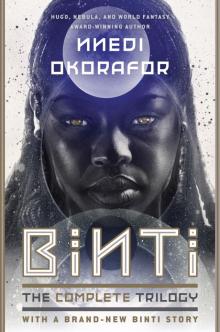 Binti, The Complete Trilogy: Binti ; Home ; The Night Masquerade
Binti, The Complete Trilogy: Binti ; Home ; The Night Masquerade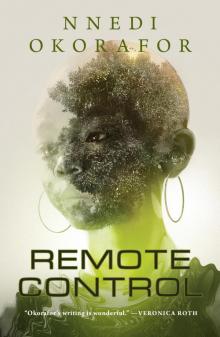 Remote Control
Remote Control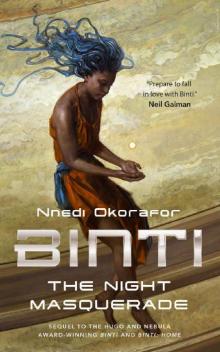 Binti: The Night Masquerade
Binti: The Night Masquerade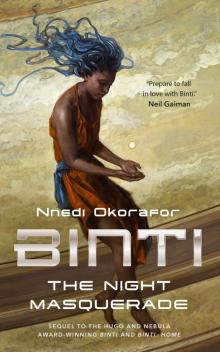 Binti--The Night Masquerade
Binti--The Night Masquerade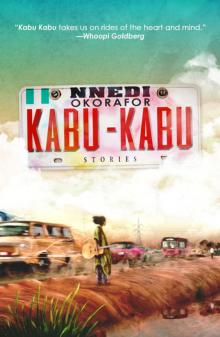 Kabu Kabu
Kabu Kabu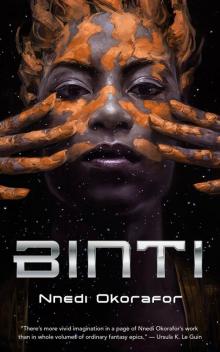 Binti
Binti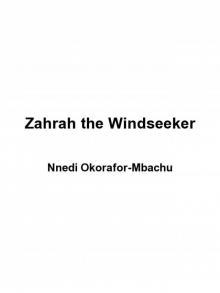 Zahrah the Windseeker
Zahrah the Windseeker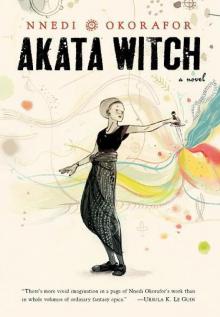 Akata Witch: A Novel
Akata Witch: A Novel Ikenga
Ikenga Who Fears Death
Who Fears Death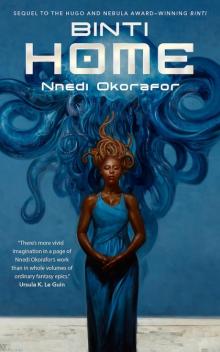 Binti--Home
Binti--Home Lagoon
Lagoon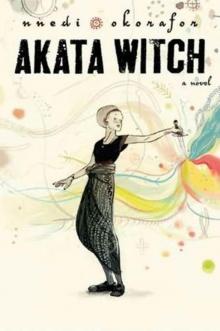 Akata Witch
Akata Witch The Book of Phoenix
The Book of Phoenix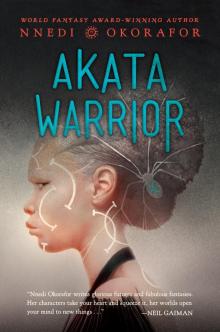 Akata Warrior
Akata Warrior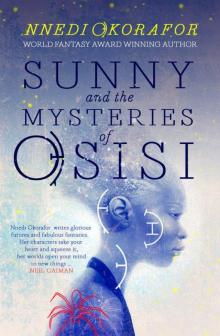 Sunny and the Mysteries of Osisi
Sunny and the Mysteries of Osisi